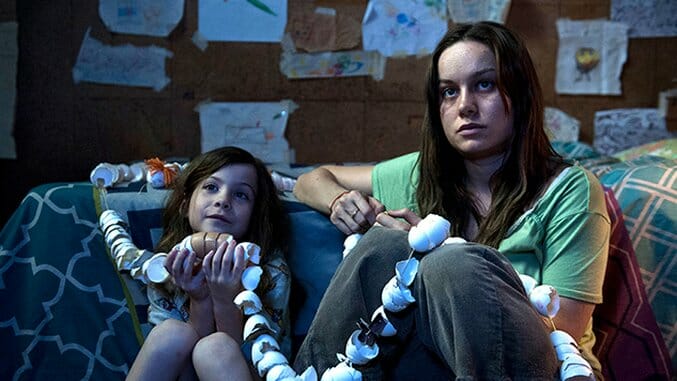
A potentially sensational premise is handled with grace and incisiveness in Room, Lenny Abrahamson’s adaptation of Emma Donoghue’s best-selling novel. Scripted by the author herself, and hewing closely to her book’s adolescent point-of-view, the film opens in what is initially known only as “Room,” a small, crowded space filled with a bed, a wardrobe, a few kitchen appliances, a table and drawings that decorate its walls. In this environment, which boasts a skylight but no windows, live Joy (Brie Larson) and her long-haired son Jack (Jacob Tremblay), the latter of whom has apparently never stepped outside Room’s sole door. That entryway is locked via a keypad, and only opened and closed by Old Nick (Sean Bridgers), a bearded figure who appears in the night while Jack sleeps (or pretends to) in order to deliver supplies and have his way with Joy.
Abrahamson’s film immediately sets itself alongside Jack, assuming his perspective as he narrates his thoughts, anxieties and skewed comprehension of reality. Believing that the world outside Room is “outer space,” that Room’s fixtures are his friends (he gives them all a morning greeting), and that only he, his mother and Old Nick are “real” (unlike the soap opera stars and Dora the Explorer cartoons he watches on TV), Jack is a boy capable of processing life solely through the warped prism of his hermetic upbringing. Room evokes his POV with curiosity and despondence—and always with intimacy—so that his fear is palpable when Old Nick makes his nocturnal visits, and his anger is overpowering when Joy explains to him the truth about their situation. It’s a revelation that, coming on the heels of Jack’s fifth birthday, is all the more shattering for being virtually impossible for the kid to properly comprehend.
Although that bombshell arrives within the film’s first half hour, explaining more of Room’s plot is to unavoidably venture into spoiler-ish territory—and to rob it of at least some of its dramatic surprise. Nonetheless (Vague spoilers follow. — Ed.), the reasons for Joy and Jack’s confinement are of a real-world (rather than science-fiction) variety, and compel Joy to take drastic, risky action to save both herself and her son. In the traumatic events that follow, what emerges is a stirring portrait of maternal altruism, as Joy sacrifices their safety, as well as her one true connection to the real world, in order to potentially offer her offspring a future that expands past the constricting walls of his makeshift prison home.
Abrahamson’s direction can verge on the cloying, especially courtesy of Jack’s oh-what-a-fantastical-world! inner musings. Yet even though Room frequently seems just about to spill over into melodramatic mawkishness, it maintains a firm grasp on not only its characters’ convincing turmoil, but on the way in which their behavior—sometimes noble, occasionally thoughtless or even mean—speaks to the selflessness of devotion, be it that of a parent, a child, a new friend or a canine playmate. Moreover, it does so without condemning its characters’ failings, which it recognizes are the unfortunate and messy byproducts of unfortunate and messy circumstances. That refusal to paint in black-and-white terms elevates the film above a standard-issue tearjerker, lending its tale a complexity that allows its story’s heartrending twists and turns to be more resonate.
Credit for Room’s affecting power, however, ultimately goes to its two leads. Looking alternately stout and fragile to the point of suffering a nervous breakdown, Larson imagines Joy as a woman who’s willfully chosen to define herself via her motherhood. Her determined parental commitment serves as both the movie’s emotional foundation and the source of complications once cataclysmic events force her to reassess her role in Jack’s upbringing, and what that might mean for her own sense of self. It’s a nuanced, knotty performance that never loses sight of its believable reality, and it smoothly meshes with the work of her pint-sized co-lead. Embodying Jack as something along the lines of an alien-human hybrid struggling to grasp a vast civilization that he’s only experienced, figuratively speaking, through a tiny peephole, Tremblay delivers an impressively interior turn free of hammy mannerisms. In the process, he, more than anything else in the film, provides its guiding nurture-vs-nature idea: Whether it’s love or cruelty we receive, we’re all just byproducts.
Director: Lenny Abrahamsom
Writer: Emma Donoghue
Starring: Brie Larson, Jacob Tremblay, Sean Bridgers
Release Date: October 16, 2015